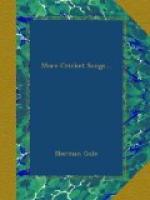THE CATCH OF THE SEASON.
He was a person most unkempt,
And answered to the name of
Cust.
He had a frenzied mass of hair,
A little redder than red rust,
And trousers so exceeding short
It looked as if by mounting
high
They meant unceasingly to
try
To change to knickers on the
sly.
He was a person whom a Bat
Could view without the least
distrust.
He caught me at the fifth attempt—
Imagine my profound disgust!
For if the ball had gone to hand
I had not felt the least unrest;
But, as it happened (Fate
knows best!)
It struck him smartly on the
chest.
I cannot tell you how he squirmed
And capered on the greensward
there,
Until at last he took the ball
(Or so it seemed) from out
his hair,
And meekly rubbed the coming bruise.
Thus was I humbled in the
dust
Because of Albert Edward Cust.
Imagine my profound disgust!
Here’s to the freckles and fielding
and fun,
Here’s to the joy that
we ponder;
Here’s to the Game that will glow
in the sun
When the babes of our babies
are—Yonder!
* * * * *
Rivers’ Popular Novels
Crown 8vo., 6_s_.
* * * * *
The House of Merrilees. ARCHIBALD MARSHALL. [Now Ready.
The Unequal Yoke. Mrs. H.H. PENROSE. [Now Ready.
The Discipline of Christine. Mrs. BARRE GOLDIE. [Now Ready.
Peter Binney, Undergraduate. ARCHIBALD MARSHALL. [Now Ready.
Peace on Earth. REGINALD TURNER. [Now Ready.
The Countermine. ARTHUR WENLOCK. [Now Ready.
The Friendships of Veronica. THOMAS COBB. [May 17.
Hugh Revel, A Public School Story. LIONEL PORTMAN. [July 25.]
Notes on Books.
In issuing a list of new and forthcoming publications, Mr. Alston Rivers cannot but express his gratification at the spirit of fair play which has enabled him to realise such a striking series of successes. The primary business of a publisher is to discriminate, both as to intrinsic literary merit, and with regard to what will hit the public taste, a classical illustration of the difficulty in gauging the latter being the rejection of “John Inglesant” by the late James Payn, then “reader” for an eminent firm. While fully recognising the remarkable gifts of the author Mr. Payn’s hesitancy as to the book’s attractions got the better of his judgment; and with “The House of Merrilees” it is now an open secret that very much the same point of view was taken in more than one instance. Mr. Marshall’s “Peter Binney, Undergraduate,” had been and is still decidedly popular, but his new book was more ambitious, possessing such a plot as




